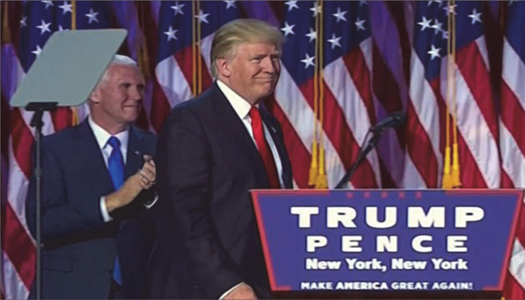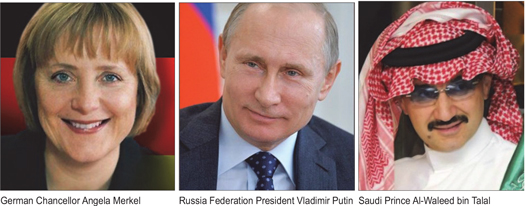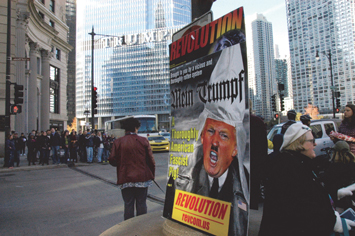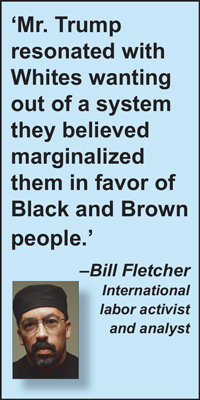The World Watches As Trump Takes Charge
By Brian E. Muhammad -Contributing Writer- | Last updated: Nov 21, 2016 - 9:55:19 AMWhat's your opinion on this article?

Donald Trump elected President of the United States. Photo: MGN Online
|

|
There were mixed reactions around the globe as Donald J. Trump was elected president of the United States of America. In a political upset, the business mogul defeated former Secretary of State Hilary Clinton to become the nation’s 45th president.
After spending months following and analyzing Mr. Trump’s world views—some controversial—stunned pundits are deciphering what may have been campaign chest bumping and hyperbole versus what actual Trump foreign policy will be.
There is his proposed wall along the U.S.-Mexican border that Mr. Trump maintains “Mexico is going to pay for.” With sweeping House and Senate wins by the GOP, pundits say he might gain the votes to pursue it.
Some world leaders congratulated Mr. Trump while others anxiously awaited details about what the Trump world view would look like. European ally Chancellor Angela Merkel of Germany cautiously pledged to work with Mr. Trump.
“Please accept my congratulations on your election as President of the United States of America,” wrote Chancellor Merkel.
“You will assume office at a time in which our countries are jointly facing many different challenges. Germany’s ties with the United States of America are deeper than with any country outside of the European Union.”
The chancellor faces intense opposition to liberal policies allowing foreign migrants seeking economic and political refuge to enter Germany. During his campaign Mr. Trump was very critical of open door policies for migrants.
A Politbarometer poll revealed 82 percent of Germans view Mr. Trump’s election as “bad or very bad” and 65 percent anticipate German/U.S. relations weakening under Mr. Trump.
Russia Federation President Vladimir Putin expressed optimism for better relations with an America led by Mr. Trump. By Nov. 14, it was reported that the two men had spoken via telephone.

Anti Trump sign at downtown Chicago demonstration across from Trump Tower. Photo: Haroon Rajaee
|
Russia was a frequent topic in campaign controversy associated with questionable handling of official and classified emails by Mrs. Clinton. U.S. officials accused the Russian Federation of cyber hacking Democratic Party computers, other computers and meddling in the U.S. election. Other important issues include the war in Syria and unsettled friction between Russia and the Americanbacked government in Ukraine.
Responses from the Arab and Muslim world varied. Mr. Trump advocated a moratorium on immigrants coming to America from the Middle East until persons are vetted for ties to terrorist groups. The proposed policy angered people in countries where Muslims are dominant causing rounds of criticism toward Mr. Trump. However in the Gulf countries, like the United Arab Emirates and Saudi Arabia, leaders expressed a willingness to look past the moratorium and embrace business and trade with a Trump administration.
In 2015 business between Gulf nations and American companies was brisk. The U.S. imported $32.4 billion in commodities and services from the region. The region is an essential client for Boeing, the aviation giant, and other defense firms.
Saudi Prince Al-Waleed bin Talal, head of investment firm Kingdom Holding which has stakes in U.S. firms including Citigroup and Twitter, had called Mr. Trump a “disgrace not only to the GOP but to all America.”
However he was among the well-wishers on Mr. Trump’s victory, tweeting: “President elect @realDonaldTrump whatever the past differences, America has spoken, congratulations & best wishes for your presidency.”
With Mr. Trump a staunch critic of U.S. policy in the Middle East the fate of efforts by the Obama administration in the region is unclear. One policy being closely watched is renewed relations with the Islamic Republic of Iran since the lifting of sanctions and softening of three decades of hostility. The American-led deal between Iran and the United Nations Security Council plus Germany known as the Joint Comprehensive Plan of Action or JCPOA is considered a foreign policy hallmark of President Obama’s administration. It aimed at limiting nuclear weapon development in Iran and opening the country for international trade and development.
Mr. Trump has threatened to tear up the agreement if elected.
“Iran’s understanding in the nuclear deal was that the accord was not concluded with one country or government but was approved by a resolution of the UN Security Council and there is no possibility that it can be changed by a single government,” Iranian President Hassan Rouhani said, according to state television.
The deal has benefitted America and Europe, allowing for brisk business in Iran. If Trump announces reversing the pact, “all U.S. sanctions that have been lifted or suspended are going to be re-imposed, by executive order,” Mark Dubowitz, executive director of the Foundation for the Defense of Democracies told USA Today.

|
Reuters reported Mr. Trump’s win emboldened right-wing parties in Austria, France and the Netherlands, among other countries.
International labor activist and analyst Bill Fletcher said these issues have been in motion over several decades in the U.S. and especially in Europe.
Mr. Trump resonated with Whites wanting out of a system they believed marginalized them in favor of Black and Brown people, said Mr. Fletcher. Mr. Trump gave articulation to White fear and discontent as did some European leaders who used xenophobic political rhetoric in a backlash against migrants from Africa and the Middle East seeking political and economic sanctuary, he added.
Domestically and internationally Mr. Trump personifies “right-wing populism” and Whites experiencing a manifest fall of their world economically and socially, Mr. Fletcher continued. They see him as a hope and an opportunity to rise back up, he added.
“All of a sudden in a number of these European countries the ability for growth was frustrated and it’s in that context that you see the reemergence of various kinds of right wing populace movements,” Mr. Fletcher explained.
In America, Mr. Fletcher said, the right wing populace was reflected in a White backlash combined with economic decline that Mr. Trump tapped into. “It’s driven by the collapse of the American dream for White people. That’s why race is central to this,” Mr. Fletcher told The Final Call. In better days during the 1980s and 1990s when globalization only disproportionately impacted minority groups, very few Whites took note because “they still believed the American dream was going to protect them,” said Mr. Fletcher.
Whites suffered social dislocation and economic anxiety.
Many Whites drew the conclusion that “it doesn’t pay to be White anymore” and the system gave the Mexicans, Blacks and others their place on the social rung, he argued. “That is the subtext to right wing populism,” he explained. It permeated both White America and Europe, said the former executive director of TransAfrica.
In the U.S. and Britain, for example, “there was tremendous fear of the changing complexion of both societies brought on by migration and economic dislocation—or the threat of economic dislocation,” Mr. Fletcher said.
But until the president-elect is sworn in, what he will actually do remains to be seen, he cautioned.
Meanwhile the president-elect, in an early interview, wavered a little on building the wall with Mexico but promised to deport two million to three million undocumented immigrants who have committed crimes.
INSIDE STORIES AND REVIEWS
-
-
About Harriett ... and the Negro Hollywood Road Show
By Rabiah Muhammad, Guest Columnist » Full Story -
Skepticism greets Jay-Z, NFL talk of inspiring change
By Bryan 18X Crawford and Richard B. Muhammad The Final Call Newspaper @TheFinalCall » Full Story -
The painful problem of Black girls and suicide
By Charlene Muhammad -National Correspondent- » Full Story -
Exploitation of Innocence - Report: Perceptions, policies hurting Black girls
By Charlene Muhammad -National Correspondent- » Full Story -
Big Ballin: Big ideas fuel a father’s Big Baller Brand and brash business sense
By Bryan Crawford -Contributing Writer- » Full Story






 Click Here Stay Connected!
Click Here Stay Connected!








